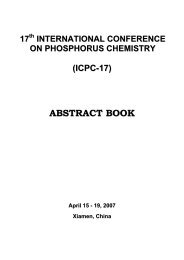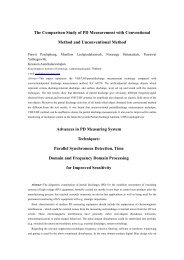New Modes of GPCR Signalling
New Modes of GPCR Signalling
New Modes of GPCR Signalling
You also want an ePaper? Increase the reach of your titles
YUMPU automatically turns print PDFs into web optimized ePapers that Google loves.
Cyclin D1 Promotes Anchorage-independent Cell Survival by Inhibiting<br />
FOXO-Mediated Anoikis<br />
Lu Gan 1, Xiangliang Yang 1, Huibi Xu 1, Haojie Huang 2<br />
1. College <strong>of</strong> Life Science and Technology, Huazhong University <strong>of</strong> Science and<br />
Technology, Wuhan 430074, China<br />
2. Masonic Cancer Center, University <strong>of</strong> Minnesota, Minneapolis, MN 55455, USA<br />
Aim: Adhesion to an appropriate extracellular matrix (ECM) is important for normal<br />
cells to survive, and detachment from such supportive matrices usually triggers a<br />
specific type <strong>of</strong> apoptosis termed anoikis. However, most cancer cells are commonly<br />
resistant to anoikis and can survive in the presence <strong>of</strong> an inappropriate ECM or in the<br />
absence <strong>of</strong> anchorage to the ECM. O-class Forkhead box (FOXO) transcription factors<br />
are critical regulators <strong>of</strong> diverse cellular processes, including apoptosis, cell-cycle arrest,<br />
DNA damage repair and oxidative stress resistance. In this study we determined<br />
whether FOXOs are involved in anoikis and its mechanism. Methods: Annexin V-PE<br />
apoptosis detection kit and s<strong>of</strong>t agar colony formation assay were used to measure the<br />
anoikis in prostate cancer cells. FOXOs activities were determined using a generic<br />
FOXO luciferase reporter gene that contains three copies <strong>of</strong> forkhead response elements.<br />
Immunoprecipitation was used to determine the endogenous and exogenous interaction<br />
between cyclin D1 and FOXO. In vitro protein binding assay was used to confirm the<br />
interaction between the two proteins. In vitro kinase activity determined whether<br />
FOXO1 was phosphorylated by CDK4/CDK6. Results: FOXO1 and FOXO3a play an<br />
essential role in promoting cell detachment-induced anoikis. In contrast, elevated cyclin<br />
D1 inhibits anoikis. We further show that cyclin D1 interacts with FOXO proteins and<br />
impedes their transcriptional regulatory and anoikis-promoting functions. This effect <strong>of</strong><br />
cyclin D1 requires its transcription repression domain but is independent <strong>of</strong><br />
cyclin-dependent kinases CDK4 and CDK6. Moreover, we demonstrate that<br />
cancer-derived mutants <strong>of</strong> cyclin D1 are much more stable than wild-type cyclin D1<br />
under anchorage-independent conditions and possess a greater antagonistic effect on<br />
FOXO-regulated anoikis and anchorage-independent growth <strong>of</strong> cancer cells.<br />
Conculsion: These data suggest that cyclin D1 may play a critical role in tumorigenesis<br />
and cancer metastasis by inhibiting the anoikis-promoting function <strong>of</strong> FOXO proteins.<br />
Keywords: Foxo; cyclin D1; Anoikis; protein-protein interaction<br />
Author: Lu Gan,PhD, College <strong>of</strong> Life Science and Technology, Huazhong University<br />
<strong>of</strong> Science and Technology, Wuhan 430074, China, Tel: 86-27-87792147<br />
E-mail: lugan@mail.hust.edu.cn












